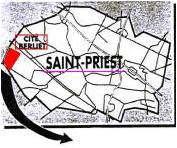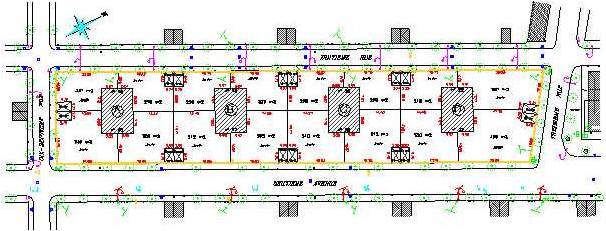
A Berliet car, from Wikipedia
His company started manufacturing car engines in 1894, then trucks in 1906. In 1915, in order to meet military demand in the First World War, Berliet constructed a large factory in Venissieux and St. Priest, less than 10 km south-east of Lyon.


Location Plan
To accommodate the workers he also built workmen’s housing. A big proportion of the houses were “maison carre a Mulhouse”- quadruple houses like those in Mulhouse.

Site Plan, from Google Earth

Drawing of Site plan, from Dorothee Thevenon

Detail of Quadruple House, from Dorothee Thevenon
The first quadruple houses were designed in 1920. These were villas were dividedinto four units. In 1924, a new design appeared with separate units on the ground and first floors. Thus each block then contained 8 units. This was due to the financial difficulties of that period. However, later blocks reverted back to the earlier model; by 1925, Cite Berliet comprised 250 units.

Drawn Perspective, from Dorothee Thevenon

Perspective View, from Google Earth
Unfortunately for Berliet, after the Second World War he was condemned to two years imprisonment for collaboration with the Nazis, and his possessions were seized. However in 1949, the state returned them to the Berliet family, a few months after his death.
The Berliet marquee disappeared in 1978 when it was absorbed by Renault.
References: http://fr.wikipedia.org/wiki/Cit%C3%A9
Dorothee Thevenon, “Mise en Copropriété d’une cité ouvrière de 354 logements : la « Cité Marius Berliet » à Saint Priest”, 2003. Pdf download 4.5 Mb
Related Post: |
Social Bookmarking
No comments:
Post a Comment